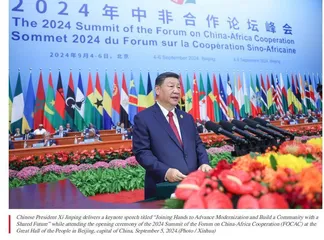GLOBAL DEVELOPMENT INITIATIVE
作者: Luo Zhaohui

Promoting High-Quality Development of China’s Foreign Assistance and International Development Cooperation by Studying and Implementing Xi Jinping Thought on Socialism with Chinese Characteristics for a New Era
Xi Jinping Thought on Socialism with Chinese Characteristics for a New Era is Marxism of contemporary China and Marxism of the 21st century, reflecting the essence of both the Chinese culture and the Chinese ethos. It is the latest breakthrough in applying Marxism in the Chinese context. As the main architect of the thought, with an acute observation of the evolving international landscape and the underlying trends of the times and from a perspective of seeking development for the world and the whole humanity, with the future of mankind in mind and a great sense of responsibility as the leader of a major country and major party, General Secretary Xi Jinping has put forth a series of transformative new concepts, new ideas and new initiatives, leading to major breakthroughs in both theory and practice guiding China’s foreign assistance and international development cooperation.
Theoretical Origins of China’s Foreign Assistance and International Development Cooperation in the New Era
The idea of building a community with a shared future for mankind is the theoretical foundation for China’s foreign assistance and international development cooperation in the new era. In the 1990s, with the disintegration of the Soviet Union and the end of the Cold War, globalization began to speed up. Following the “9·11” terrorist attacks in 2001 and the international financial crisis in 2008, there began reflections on globalization from both political and economic perspectives, with the ensuing rise of protectionism and unilateralism. Against such a backdrop, General Secretary Xi Jinping put forward in 2013 the idea of building a community with a shared future for mankind, and the Belt and Road Initiative, which stressed the need to promote globalization and an open world economy through policy coordination, unimpeded trade, financial integration, infrastructure connectivity and closer people-to-people connectivity. During his visits to Asian, African and Latin American countries, General Secretary Xi Jinping put forward a series of new ideas and concepts, such as the principles of “sincerity, real results, amity, and good faith”, “amity, sincerity, mutual benefit, and inclusiveness”, “pursuing shared interests while upholding the greater good”, “small but beautiful” projects, among others, which have contributed Chinese wisdom and Chinese strength to building a new and balanced development paradigm featuring mutual benefit, coordination, inclusiveness, win-win cooperation, and shared prosperity.
With the once-in-a-century pandemic combined with changes unseen in a century, aggravated geopolitical conflicts, faltering recovery of the world economy, and lack of focus on the development agenda, the world has entered into a new period of turmoil and transformation. On the other hand, China has won the war on absolute poverty, completed the task of building a moderately prosperous society in all respects, and has maintained steady economic growth, thus injecting strong impetus into world economic development and raising the expectations of the world about China. In 2021, during the general debate of the 76th United Nations General Assembly, General Secretary Xi Jinping solemnly put forth the Global Development Initiative (GDI), which dovetails with the UN 2030 Agenda for Sustainable Development, pools development consensus, and promotes common development. The GDI provides answers to the fundamental theoretical questions of why we should pursue development, what development is for, who development should rely on and how to realize development, thus creating a new paradigm for international development cooperation.
These important ideas and initiatives are deeply rooted in the spirit of internationalism of Marxism. Marxism takes as its historical mission the complete emancipation of the proletarians and humanity as a whole. It was pointed out in the Communist Manifesto that the proletarians can only emancipate themselves after emancipating mankind. United actions among countries, at least among civilized countries, is the primary condition for the emancipation of the proletarians. Guided by the Marxist spirit of internationalism, proletarians worldwide began to pay attention to their cooperation and mutual assistance, which greatly promoted the development of the world proletarian revolution. China’s international development cooperation has always been committed to internationalism, with China standing in solidarity with other developing countries for common development.
These important ideas and initiatives are deeply rooted in the 5,000-plus years of traditional Chinese culture. In the eyes of the Chinese, the world is for all the people under heaven to live in harmony. Chinese philosophies such as “Mankind is one community”, “upholding integrity and amity with thy neighbor” all carry on the cultural DNAs of the Chinese nation, which depicts the beautiful vision of the Chinese people for a beautiful world. Drawing strength from the fine traditional Chinese culture, the CPC has always set its eyes on the future of mankind and handled its external relations in line with the overarching trends of human development, the evolving international order and the historical logic of China’ development. Upholding equity and justice, we have always stood on the right side of history and on the side of human progress.